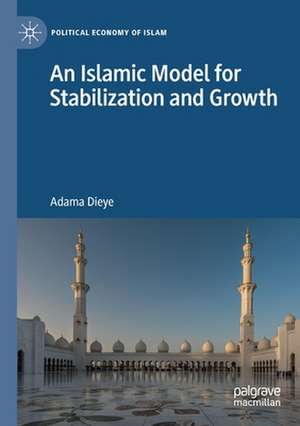An Islamic Model for Stabilization and Growth: Political Economy of Islam
Autor Adama Dieyeen Limba Engleză Paperback – 17 iul 2021
| Toate formatele și edițiile | Preț | Express |
|---|---|---|
| Paperback (1) | 693.39 lei 6-8 săpt. | |
| Springer International Publishing – 17 iul 2021 | 693.39 lei 6-8 săpt. | |
| Hardback (1) | 698.80 lei 6-8 săpt. | |
| Springer International Publishing – 17 iul 2020 | 698.80 lei 6-8 săpt. |
Preț: 693.39 lei
Preț vechi: 815.75 lei
-15% Nou
Puncte Express: 1040
Preț estimativ în valută:
132.68€ • 138.88$ • 110.43£
132.68€ • 138.88$ • 110.43£
Carte tipărită la comandă
Livrare economică 31 martie-14 aprilie
Preluare comenzi: 021 569.72.76
Specificații
ISBN-13: 9783030487652
ISBN-10: 3030487652
Pagini: 243
Ilustrații: XXIII, 243 p. 12 illus.
Dimensiuni: 148 x 210 mm
Greutate: 0.32 kg
Ediția:1st ed. 2020
Editura: Springer International Publishing
Colecția Palgrave Macmillan
Seria Political Economy of Islam
Locul publicării:Cham, Switzerland
ISBN-10: 3030487652
Pagini: 243
Ilustrații: XXIII, 243 p. 12 illus.
Dimensiuni: 148 x 210 mm
Greutate: 0.32 kg
Ediția:1st ed. 2020
Editura: Springer International Publishing
Colecția Palgrave Macmillan
Seria Political Economy of Islam
Locul publicării:Cham, Switzerland
Cuprins
Introduction.- Overview of Current Macroeconomic Policy Issues and Challenges In Mainstream Economics.- Current Economic and Social Challenges and Islam.- Islamic Institutional Policy Framework.- Rules of Economic and Financial Operations.- Sustainability of the Senegal Socio-economic Model.- Counterfactual simulation of the Islamic model for Senegal.- Implementation of the Islamic Model for Senegal.- Conclusion.
Notă biografică
Adama Dieye is former Director of Department of the Central Bank of West African States (BCEAO), Senegal.
Textul de pe ultima copertă
This book argues that the macroeconomic policy adjustment models recommended by the IMF and the World Bank for implementation in many Muslim countries, with substantial donor financial support, have not been effective. Economic indicators show low economic growth, persistent fiscal and external deficits and limited industrialization. Also, these countries are experiencing increases in unemployment, poverty and substantial growth in income and wealth inequalities. These facts underline an urgent need to produce an alternative to the failed conventional macroeconomic model in order to address the challenge of macroeconomic and social adjustment policies. The project posits and investigates the idea that the Islamic economic model prescribed in the Quran and applied by the Prophet (sawa) could be the ideal model for Muslim as well as non-Muslim countries.
Adama Dieye is former Director of Department of the Central Bank of West African States (BCEAO), Senegal.
Caracteristici
Argues that the macroeconomic policy adjustment models recommended by the IMF and the World Bank for implementation in many countries have not been effective Underlines an urgent need to produce an alternative to the failed conventional macroeconomic model in order to address the challenge of ?macroeconomic and social adjustment policies Investigates the idea that the Islamic economic model prescribed in the Quran and applied by the Prophet (sawa) could be the ideal model for Muslim and non-Muslim ?countries Designs a macroeconomic policy framework that recommends macroeconomic and social policies consistent with Islamic economic principles and simulates its relevance with Senegal as a case study












